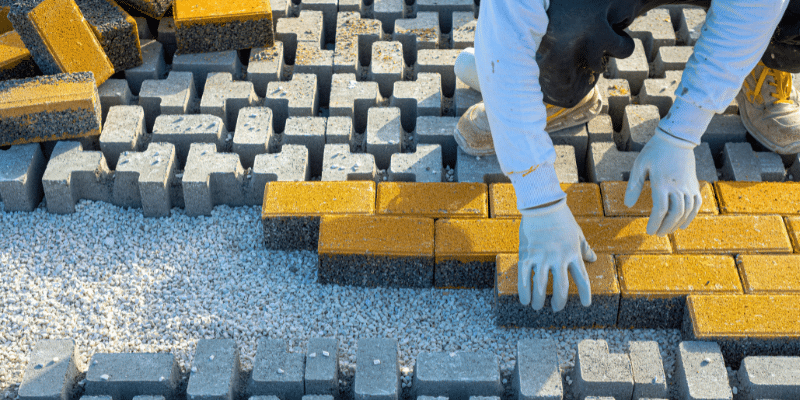hello world!

Your patio surface does more than host a barbecue. It has to shrug off winter weather, channel spring downpours, and still look sharp after a decade of salt, sun, and foot traffic. If you’re looking to build your first patio or refurbish one, it’s important to consider the needs of this outdoor surface.
At Hamilton Builders’ Supply, we stock every major paving material, so you can match performance to budget without guessing. In this guide, we explain your options and what to consider about installation, maintenance and more.
Weather here swings from -20 °C of freezing cold, meter-deep snowpacks to hot, humid summers that push +30 °C with UV levels that bleach unprotected concrete. Therefore, good patio materials must:
Selecting the right products at the start saves repairs later and protects the investment you make in furniture, lighting, and landscaping.
Interlocking bricks are individual concrete units that lock together with tight joints filled by polymeric or jointing sand. Hamilton Builders’ carries profiles from Permacon, Techo-Bloc, Unilock, Oaks, Best Way Stone, and Triple H.
Endless colours, patterns and edge curves; if a unit cracks, you can lift and replace just that stone. Properly installed, they last decades and handle driveway loads.
A patio needs about 230 mm (9 in.) of excavation: 100 mm of open-graded limestone base, 25 mm of bedding sand, then the 60 mm paver itself.
Turn-key patio installations in Ontario averaged $18 – $25 / sq ft in 2025, depending on stone style and design. Materials alone start near $6 / sq ft for classic textures.
Re-sand joints every few years, sweep off leaves before winter, and seal if you want enhanced colour.
Concrete or composite slabs up to 600 × 900 mm create a clean, contemporary grid with fewer joints to sweep.
Because weight is spread over a bigger footprint, slabs sit comfortably on a slightly thinner 150 mm base, ideal when you want a low threshold at a back door.
They install faster than small pavers and excel beneath sectional seating where leg wobble is a nuisance.
Up-front price is similar to mid-range pavers, but note that repairs mean lifting a much heavier unit; order a few extras and store them out of the weather.
Natural stone, like Ontario limestone and imported sandstone, gives patios a timeless, organic feel.
Stone is naturally dense and slip-resistant, but each slab is unique, so labour costs rise to fit irregular shapes tightly.
Expect $24 – $31/sq ft installed for dry-laid flagstone in 2025.
Set stone on the same open-graded base used for pavers and sweep polymeric sand into joints or mortar the surface to a concrete pad for a billiard-table finish that resists ant tunnels.
Annual sealing helps repel leaf tannins and barbecue spills.
Twenty-millimetre vitrified tiles bring indoor aesthetics outside without the maintenance headaches of natural stone.
Because porcelain absorbs almost no water, it is freeze-thaw proof, salt-safe and highly slip-resistant.
Place them on the same granular base as concrete pavers or on pedestals over roof decks. Surface colour is fired into the tile, so UV fading is negligible, and a quick wash restores new-tile sheen.
Pricing has come down. Expect installed costs between premium pavers and natural stone, with the bonus of ultra-low upkeep.
Permeable interlocking concrete pavers (PICP) look like standard pavers but leave wider, stone-filled joints so rain and snowmelt drain vertically.
Ontario municipalities reward permeable surfaces with stormwater credits and easier compliance on infill lots.
Installation swaps the usual road base for a deep (200 – 400 mm) open-graded reservoir that stores runoff before it percolates or outflows.
Cost is 10–15 % higher than a conventional paver patio, but may balance out through lower stormwater fees or smaller catch-basin requirements.
Maintain performance by vacuum-sweeping joints every couple of years to remove sediment.
Regular sweeping, prompt salt-rinse in spring, and joint top-ups go further than expensive sealants. For poured concrete, monitor hairline cracks and re-seal before winter to block brine penetration. Natural stone benefits from breathable, penetrating sealers that won’t peel. Porcelain and permeable pavers need little more than an annual low-pressure wash.
Hamilton Builders’ Supply has everything you need! We stock the region’s widest range of interlocking pavers, patio slabs, natural stone, aggregates, and porcelain tiles, plus the base materials and delivery fleet to keep your project moving. Contact us to learn more or visit us in store.